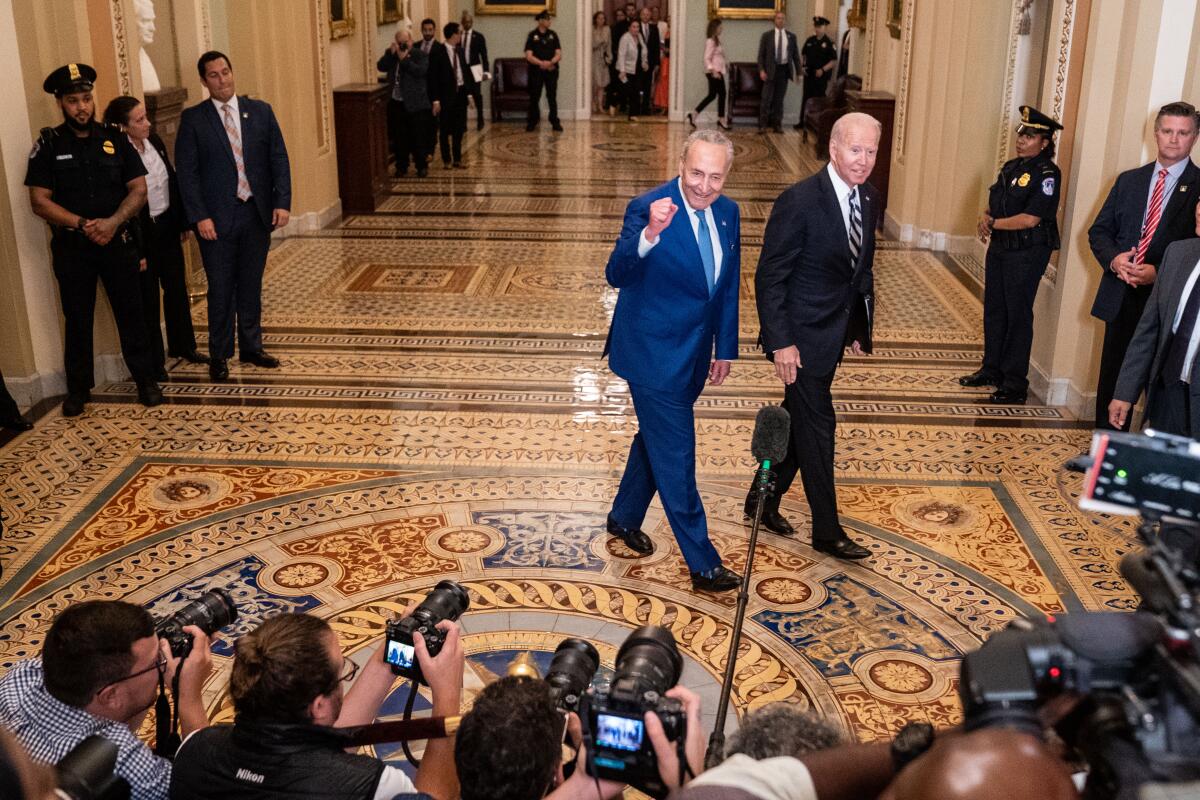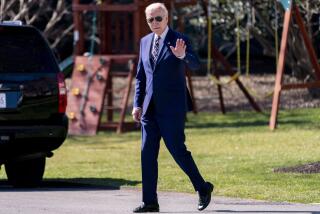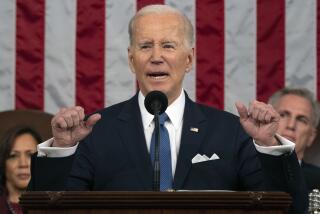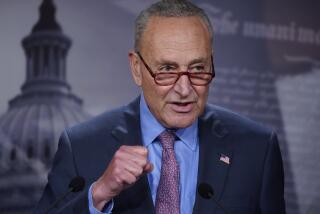Biden urges Democratic unity on rebuilding infrastructure, expanding social programs

- Share via
WASHINGTON — President Biden on Wednesday tried to solidify a fragile coalition of Democrats to make progress on his massive infrastructure proposal that would both rebuild the nation’s roads and enact a broad array of social programs, such as new Medicare benefits, child-care assistance and immigration reform.
Biden visited Capitol Hill a day after a group of Democrats said their social program bill, which Democrats plan to enact on a strict party-line vote, would total $3.5 trillion.
Added to the approximately $600 billion earmarked for “hard infrastructure” that Biden hopes to enact on a bipartisan basis, the whole package would amount to $4.1 trillion in new spending over a decade.
“We’re going to get this done,” Biden said as he arrived for the Senate Democrats’ lunch in the Capitol.
Democrats have to walk a tightrope as they try to push the bills ahead in the coming weeks. Biden’s challenge, with slim margin for error, will be preserving support from progressives, who originally wanted $6 trillion in new spending, and centrists, who wanted a smaller price tag and an assurance that it is entirely paid for.
Biden also needs the support of at least 10 Senate Republicans on the bipartisan infrastructure plan in order to pass it.
“We know we have a long road to go,” Senate Majority Leader Charles E. Schumer (D-N.Y.) said Tuesday.
The $3.5-trillion proposal exists only as a framework, with details to be negotiated in the weeks to come. The outline is ambitious and, if enacted, would be one of the most substantial expansions of government-funded social policy since the New Deal.
During a lunch visit lasting just under an hour, the president answered lawmakers’ questions and emphasized the potentially historic level of economic benefits for working families, according to senators who attended. Biden referred to the proposal as the “biggest middle-class tax cut in history,” they said.
Many Democrats emerged emboldened and cheering for a plan crafted by leadership with strong input from the White House.
But several Democrats said they wouldn’t commit support until they saw policy details and wanted to ensure that their states’ interests are represented.
Sen. Christopher S. Murphy (D-Conn.), for instance, wants railways in the Northeast to be fortified. Sen. Joe Manchin III (D-W.V.), a key centrist, sent a warning signal that he doesn’t like what he views as a move away from fossil fuels.
In the Senate, Democrats will need to keep every member of their caucus on board to pass a bill, giving each one significant leverage.
Manchin told Democratic leaders he is concerned about “maintaining the energy independence that the United States of America has and with that you cannot be moving toward the elimination of fossil.”
To address the climate crisis, the plan would impose a clean energy standard, provide tax incentives for clean energy and vehicles, impose a methane fee on oil and gas producers, create a civilian climate corps and impose climate-smart agricultural, wildfire prevention and forestry policies.
Sen. Brian Schatz (D-Hawaii), a climate hawk, praised the provisions, but acknowledged that the details are yet to be crafted. “I am very pleased about our direction,” he said.
Manchin stood up at the end and told his Democratic colleagues that he wants to work with them on the reconciliation bill, according to a senator. Although Manchin expressed some reservations about particular elements and a general concern about inflation, “it was not in a way that was saying, ‘I’m going to get in the way of this,’” according to the lawmaker.
The framework also calls for a massive expansion of Medicare to include dental, vision and hearing coverage, a longtime priority of Senate Budget Committee Chairman Bernie Sanders (I-Vt.). Sanders appears to have lost out on another priority: lowering the Medicare eligibility age to 60 or younger, although progressives are likely to continue to push for its inclusion.
The plan would also expand home- and community-based health programs, extend a temporary boost to tax credits under the Affordable Care Act and provide health insurance coverage in states that have not expanded the Medicaid program.
It would also enact a massive realignment in the prescription drug industry, a proposal that has sparked fierce opposition from some moderate House Democrats as well as the powerful pharmaceutical lobby.
The package would extend a temporary child tax credit enacted this year and provide for universal prekindergarten programs for 3- and 4-year-olds, as well as child care. A paid family and medical leave program would be created.
Sanders said the proposal would include immigration reform, but he declined to provide specifics. He previously said he planned to include a pathway to citizenship for certain immigrants.
In all of the policy areas, the details — such as the length of time certain tax breaks are in effect — will be subject to negotiation and funding levels. The $3.5 trillion will serve as a mandatory cap, and some policies may fall by the wayside or be made temporary.
“This is a notional agreement rather than anything that’s been ratified formally,” Schatz said. “Now we have to put pen to paper and flesh it out.”
To pay for the plan, Democrats would raise taxes on corporations and people making over $400,000. The IRS would also be tasked with increasing enforcement of tax rules.
Asked whether the Democrats’ effort to pass a larger bill without Republican support could jeopardize the bipartisan infrastructure package, Biden, in an Oval Office meeting with governors Wednesday afternoon, expressed general confidence. “I think it is the only way to get it done ... with two tracks,” he said.
He acknowledged, however, that there “may be some slight adjustments in the pay-fors,” given the lack of consensus even among Senate Democrats about the administration’s plan to raise taxes on corporations and the wealthiest 1% of Americans. “There might be some slight changes,” he said. “I am not sure what may happen.”
Sanders, who helped write the proposal, acknowledged he would have liked a much larger number.
“But there are 50 members of the Democratic caucus,” Sanders said. “But let’s be clear, let’s really be clear. What we are talking about is the most consequential piece of legislation passed since the 1930s.”
In the House, the chair of the Congressional Progressive Caucus, Rep. Pramila Jayapal (D-Wash.) expressed optimism. “Obviously, our caucus’ support is not guaranteed until we see how our priorities fit into the proposed framework ... particularly the specific funding amounts for the program so that we can make sure that everything is robustly and sufficiently funded.”
The bipartisan portion of Biden’s plan has yet to be written too. A group of 10 Republicans and Democrats has been holding closed-door meetings to write that legislation after Biden and the lawmakers reached an agreement on the top-line numbers last month.
Times staff writer Sarah D. Wire contributed to this report.
More to Read
Get the L.A. Times Politics newsletter
Deeply reported insights into legislation, politics and policy from Sacramento, Washington and beyond. In your inbox three times per week.
You may occasionally receive promotional content from the Los Angeles Times.












